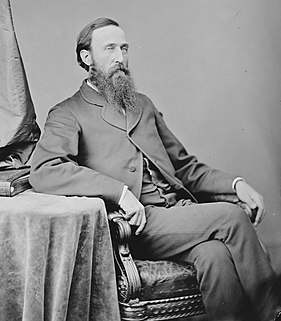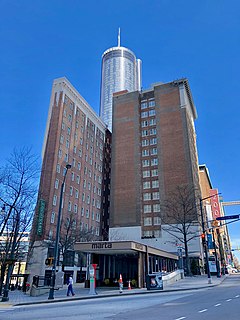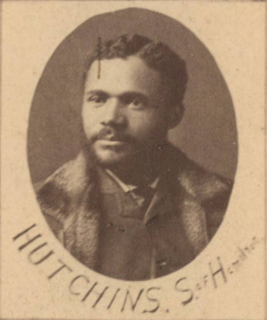Related Research Articles

Scholars have identified more than 1,500 African American officeholders who served during the Reconstruction Era (1865–1877) after passage of the Reconstruction Acts in 1867 and 1868 as well as in the years after Reconstruction before white supremacy, disenfranchisement, and the Democratic Party fully reasserted control in Southern states. Historian Canter Brown, Jr. noted that in some states, such as Florida, the highest number of African Americans were elected or appointed to offices after 1877 and the end of Reconstruction. The following is a partial list some of the most notable of the officeholders pre–1900.

Richard Cassius Lee Moncure was a Virginia politician and jurist, serving for more than 25 years on what became the Virginia Supreme Court.
John W. A. Sanford Sr. was a plantation manager, military officer, land agent, and politician from Georgia. He served as Secretary of State of Georgia and in the United States House of Representatives.

Alfred Eliab Buck was a U.S. Representative from Alabama.

James Randolph Evans is an American lawyer and diplomat who served as the United States Ambassador to Luxembourg from 2018 to 2021. He presented his credentials on June 19, 2018 to the Grand Duke of Luxembourg. A member of the Republican Party from Georgia, he specializes in litigation, as well as professional, legal and government ethics. Evans is a partner at the global law firm Squire Patton Boggs. On September 21, 2017, he was selected by President Donald Trump to become the next United States Ambassador to Luxembourg. The nomination, which was submitted to the Senate on September 28, 2017, was confirmed on May 24, 2018.

James Moore Wayne was an American attorney, judge and politician who served as an Associate Justice of the Supreme Court of the United States from 1835 to 1867. He previously served as the 16th Mayor of Savannah, Georgia from 1817 to 1819 and the member of the United States House of Representatives for Georgia's at-large congressional district from 1829 to 1835, when he was appointed to the Supreme Court by President Andrew Jackson. He was a member of the Democratic Party.
Peter Vredenburgh (1805–1873) was an associate justice of the New Jersey Supreme Court from 1854 to 1868.
Reverend Romulus Moore was a politician and leader of the early civil rights movement after the American Civil War during the Reconstruction Era in the U.S. state of Georgia. An African American, Moore was elected to the state legislature in 1868. Moore was expelled from the legislature in 1868 along with other African Americans and reinstated in the Georgia General Assembly in 1870 by an Act of Congress. Reverend Moore was active in advocating the 15th Amendment to the United States Constitution.

The Mayor of Tallahassee is head of the executive branch of the government of Tallahassee, Florida.

The 1946 Georgia gubernatorial election took place on November 5, 1946, in order to elect the Governor of Georgia.
Alexander Stone was a member of Georgia's constitutional convention held in 1867 and 1868 and was an elected member of the Georgia Legislature in 1868. He was a Republican.
The "Original 33" were the first 33 African-American members of the Georgia General Assembly who were elected to office in 1868, during the Reconstruction era. They were among the first African-American state legislators in the United States. Twenty-four of the members were ministers.
Samuel Fleischman, sometimes spelled Fleishman, was a clothing merchant murdered by the Ku Klux Klan in the Florida Panhandle in 1869. Fleischman swore out an affidavit about the threat he received from a local Klan leader and store proprietor James Coker. Fleischman went to Tallahassee to seek protection but refused to stay out of Marianna, Florida as instructed by the Klan and was murdered during his return trip. The killing was part of a wave of attacks and unrest during the Reconstruction Era known as the Jackson County War.

This article is about hotels in Atlanta, including a brief history of hotels in the city and a list of some notable hotels.
William Ryal Long was a politician and public official in Florida during the Reconstruction era. He served in the Florida House of Representatives in 1873, 1874 and 1877. He lived in Monticello, Florida and represented Jefferson County, Florida. He was a Democrat.
James Ward Porter was elected a state representative in Georgia during the Reconstruction era, representing Chatham County. Before becoming a representative he was the owner of a tailor's shop in Savannah. This was unusual, as the laws in Georgia at the time largely prohibited Black people from owning property. He and other African Americans were expelled from the legislature.

Styles Linton Hutchins was an attorney, politician, and activist in South Carolina, Georgia, and Tennessee between 1877 and 1906. Hutchins was among the last African Americans to graduate from the University of South Carolina School of Law in the brief window during Reconstruction when the school was open to Black students and the first Black attorney admitted to practice in Georgia. He practiced law and participated in local politics in Georgia and Tennessee, served a single term (1887-1888) in the Tennessee General Assembly as one of its last Black members before an era of entrenched white supremacy that lasted until 1965, and advocated for the interests of African Americans. He called for reparations and attempted to identify or create a separate homeland for Blacks. He was a member of the defense team in the 1906 appeal on civil rights grounds by Ed Johnson of a conviction of rape, a case which reached the Supreme Court before it was halted by Johnson's murder by lynching in Chattanooga, Tennessee.
John William Bolts was a state legislator in South Carolina. He was elected in 1898 and 1900 from Georgetown, South Carolina and served in the South Carolina House of Representatives. Bolts was the last African American to serve in the South Carolina House of Representatives for seven decades that followed.
References
- ↑ Thompson, Scott (December 16, 2000). Laurens County. Arcadia Publishing. ISBN 9780738506388 – via Google Books.
- 1 2 Drago, Edmund L. (December 16, 1992). Black Politicians and Reconstruction in Georgia: A Splendid Failure. University of Georgia Press. ISBN 9780820314389 – via Google Books.
- ↑ White, Richard W.; Court, Georgia Supreme; Davis, Eugene (December 16, 1869). "Can a Negro Hold Office in Georgia?: Decided in Supreme Court of Georgia, June Term, 1869. : Arguments of Counsel, with the Opinions of the Judges, and the Decision of Court in the Case of Richard W. White, Clerk of Superior Court of Chatham Co., Plaintiff in Error. Versus the State of Georgia, Ex Relatione Wm. J. Clements, Defendant in Error. } Quo Warranto. Chatham". Daily Intelligencer Book and Job Office. – via Google Books.
- ↑ Thompson, Scott (December 16, 2000). Laurens County. Arcadia Publishing. ISBN 9780738506388 – via Google Books.